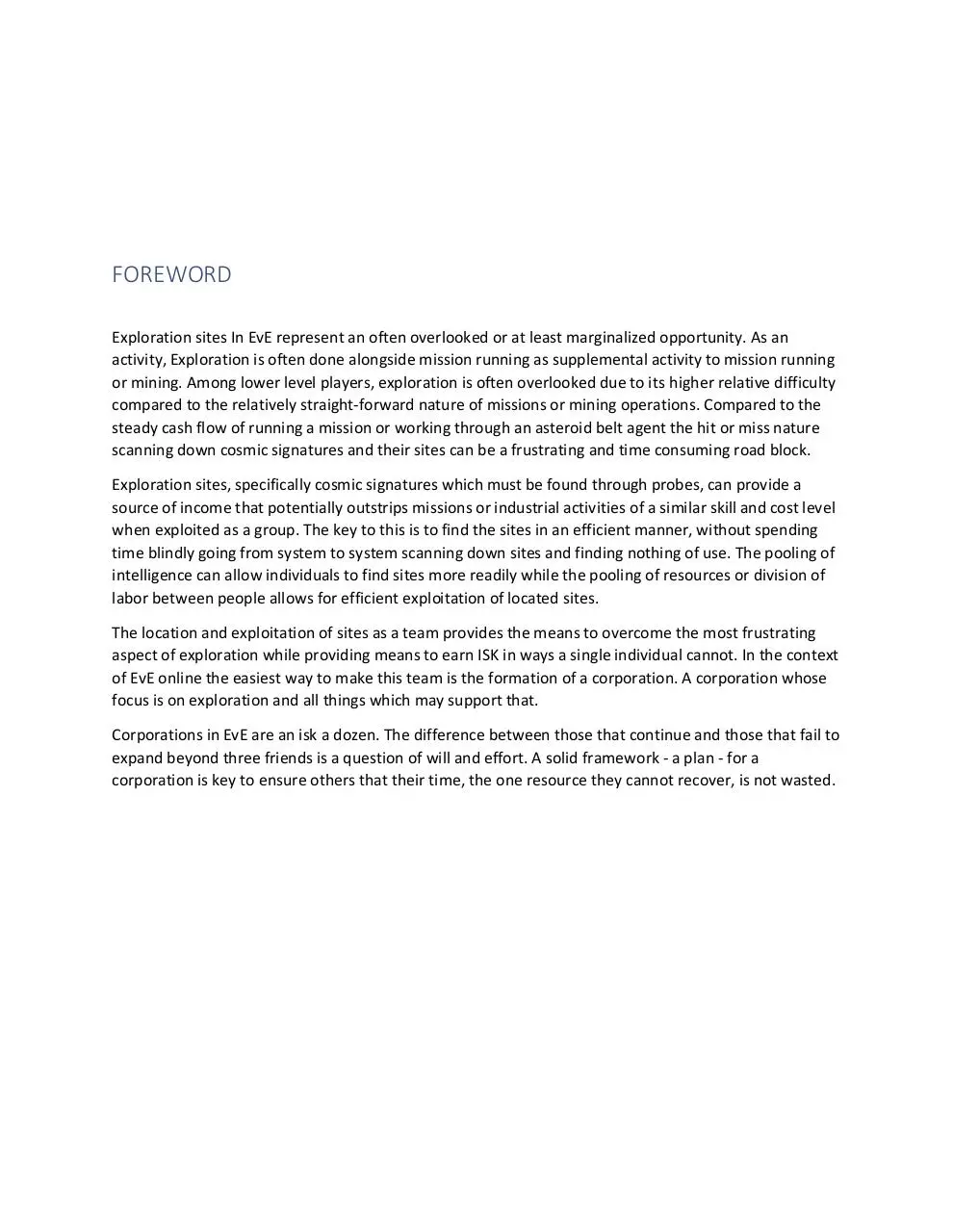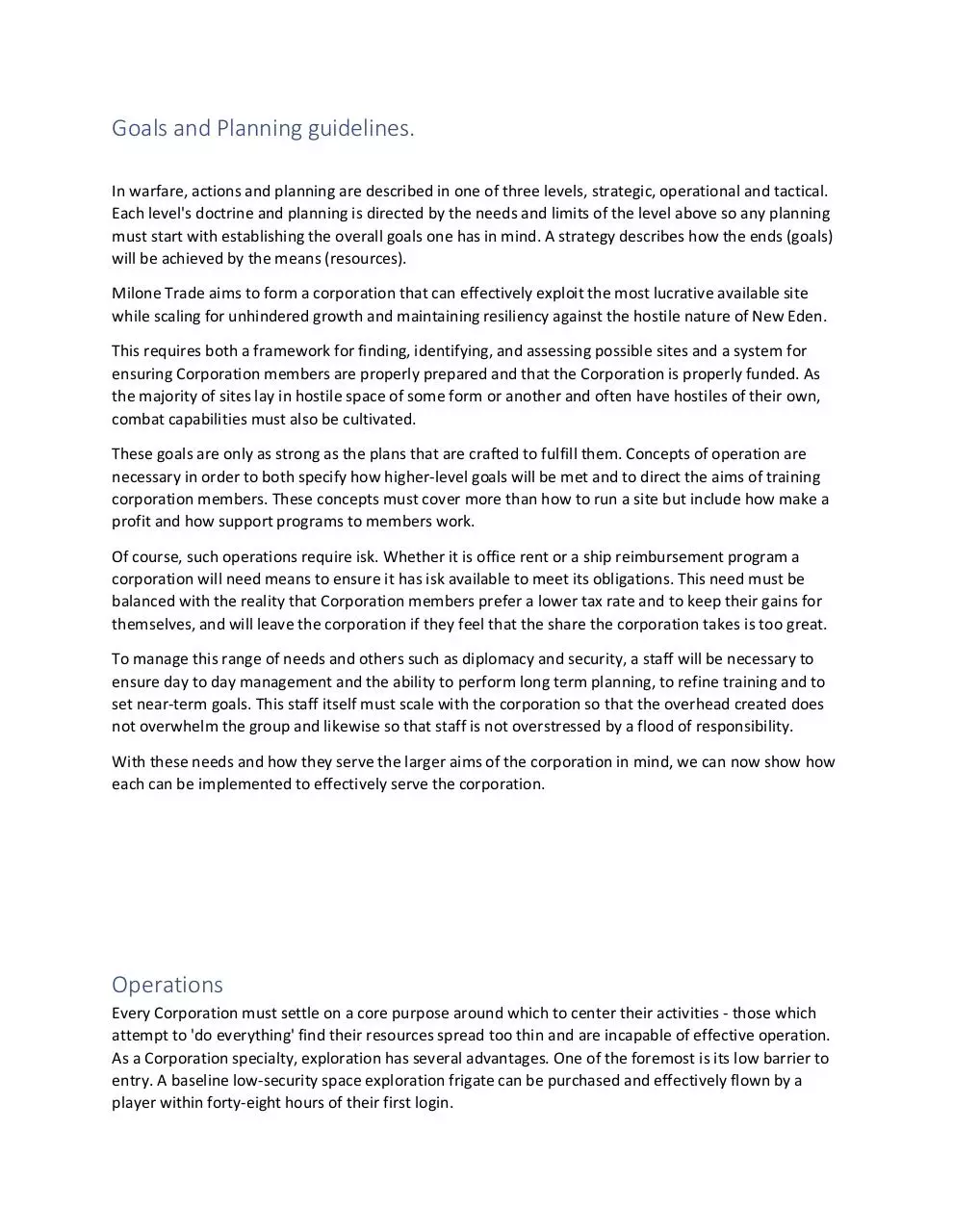Milone Trade Corporation Preliminary Policy Review (PDF)
File information
Author: D. Bass
This PDF 1.5 document has been generated by Microsoft® Word 2013, and has been sent on pdf-archive.com on 08/03/2015 at 23:28, from IP address 67.11.x.x.
The current document download page has been viewed 562 times.
File size: 460.54 KB (9 pages).
Privacy: public file





File preview
Milone Trade Corporation
Preliminary Policy Review
Contents
FOREWORD
3
GOALS AND PLANNING GUIDELINES.
4
OPERATIONS
4
FUNDING
6
ORGANIZATION AND STAFF
7
CONCLUSION
8
FOREWORD
Exploration sites In EvE represent an often overlooked or at least marginalized opportunity. As an
activity, Exploration is often done alongside mission running as supplemental activity to mission running
or mining. Among lower level players, exploration is often overlooked due to its higher relative difficulty
compared to the relatively straight-forward nature of missions or mining operations. Compared to the
steady cash flow of running a mission or working through an asteroid belt agent the hit or miss nature
scanning down cosmic signatures and their sites can be a frustrating and time consuming road block.
Exploration sites, specifically cosmic signatures which must be found through probes, can provide a
source of income that potentially outstrips missions or industrial activities of a similar skill and cost level
when exploited as a group. The key to this is to find the sites in an efficient manner, without spending
time blindly going from system to system scanning down sites and finding nothing of use. The pooling of
intelligence can allow individuals to find sites more readily while the pooling of resources or division of
labor between people allows for efficient exploitation of located sites.
The location and exploitation of sites as a team provides the means to overcome the most frustrating
aspect of exploration while providing means to earn ISK in ways a single individual cannot. In the context
of EvE online the easiest way to make this team is the formation of a corporation. A corporation whose
focus is on exploration and all things which may support that.
Corporations in EvE are an isk a dozen. The difference between those that continue and those that fail to
expand beyond three friends is a question of will and effort. A solid framework - a plan - for a
corporation is key to ensure others that their time, the one resource they cannot recover, is not wasted.
Goals and Planning guidelines.
In warfare, actions and planning are described in one of three levels, strategic, operational and tactical.
Each level's doctrine and planning is directed by the needs and limits of the level above so any planning
must start with establishing the overall goals one has in mind. A strategy describes how the ends (goals)
will be achieved by the means (resources).
Milone Trade aims to form a corporation that can effectively exploit the most lucrative available site
while scaling for unhindered growth and maintaining resiliency against the hostile nature of New Eden.
This requires both a framework for finding, identifying, and assessing possible sites and a system for
ensuring Corporation members are properly prepared and that the Corporation is properly funded. As
the majority of sites lay in hostile space of some form or another and often have hostiles of their own,
combat capabilities must also be cultivated.
These goals are only as strong as the plans that are crafted to fulfill them. Concepts of operation are
necessary in order to both specify how higher-level goals will be met and to direct the aims of training
corporation members. These concepts must cover more than how to run a site but include how make a
profit and how support programs to members work.
Of course, such operations require isk. Whether it is office rent or a ship reimbursement program a
corporation will need means to ensure it has isk available to meet its obligations. This need must be
balanced with the reality that Corporation members prefer a lower tax rate and to keep their gains for
themselves, and will leave the corporation if they feel that the share the corporation takes is too great.
To manage this range of needs and others such as diplomacy and security, a staff will be necessary to
ensure day to day management and the ability to perform long term planning, to refine training and to
set near-term goals. This staff itself must scale with the corporation so that the overhead created does
not overwhelm the group and likewise so that staff is not overstressed by a flood of responsibility.
With these needs and how they serve the larger aims of the corporation in mind, we can now show how
each can be implemented to effectively serve the corporation.
Operations
Every Corporation must settle on a core purpose around which to center their activities - those which
attempt to 'do everything' find their resources spread too thin and are incapable of effective operation.
As a Corporation specialty, exploration has several advantages. One of the foremost is its low barrier to
entry. A baseline low-security space exploration frigate can be purchased and effectively flown by a
player within forty-eight hours of their first login.
As a result, where most corporations are liable to either have SP requirements barring freshly minted
players or otherwise relegate them to peripheral tasks that seem to only tangentially relate to
Corporation operations. With Exploration however, new players can very quickly be moved into
positions in support of mainline corporation activities.
The first hurdle with running sites which benefits from simple numbers is the location of sites. In welltraveled and busy systems such as trade or mission hubs sites will quickly be found and cleared. After
each site is cleared it will randomly re-spawn elsewhere meaning sites will build up in unused systems.
This systems can be tracked down through the use of map statistics but even then the existences in sites
in these select systems must be verified.
Covering multiple star systems and clearing out their sites is an activity that requires an extensive
number of people. Low training time means that it is very easy to add new recruits to an existing scout
force. Furthermore the methods and techniques used to share information on site locations can be
adapted into a scouting network to secure operations in low security space.
Many sites however, are ill suited for exploitation by an exploration vessel. In the case of a solo player,
this would require returning to a station to grab a second ship and in the interim hoping the site is not
exploited by another player - or, in some cases, the operation of a second account. With the addition of
a second player operating in tandem with the exploration vessel allows for immediate exploitation,
avoiding both the delay of having to swap ships or the cost of running multiple accounts.
In these teams a new player can act as the scanner for a player in a ship equipped for combat or other
specialist task. The scanner can deal with non-combat data and relic sites leaving combat or other
specialist sites to the other player. While the specialist player runs the located sites the scanner can
locate the next site or proceed to loot and salvage sites that have already been cleared. This allows the
most loot to be extracted from a site with minimum down time by needing to switch between ships.
There are some items, however, that cannot be obtained from exploration. The most obvious of these is
Loyalty Points, which are obtained via running missions. The most lucrative missions are also the most
difficult and require prerequisite standings with an NPC agent's corporation for them to be offered. The
use of mission running fleets can ensure that the missions are cleared quickly and salvaged just as
quickly. The use of fleet, leveraging the sharing of standing changes, can also be used to quickly bring
fleet members to sufficient standings to access higher level missions.
When the mission fleet is spread out to simple share standing changes and mission payments each fleet
member runs missions independently of each other. The other option is for a fleet to do a single, high
level, mission together. In this approach each member of the fleet will have a role such as engaging
NPCs, providing support to fleet combatants or simply following after the fleet and salvaging the
remaining wrecks.
Eventually though, whether due to corporation activities heading into lower security space or the
actions of others, the corporation will find itself facing hostile intent from other players. This conflict
could range from a meeting engagement with a low sec roam to a formal deceleration of war that puts
all operations in empire space at risk. Many corporations not focused on player vs player conflict may
simply disband the corporation or go off-line for a period to essentially bore the opposing fleet into
'defeat'. Neither of these options are ideal and open the corporation to self-destructing as people give
up as they are told to simply do nothing.
Player vs player combat is the single most complicated activity in New Eden without venturing into the
diplomacy and tactics of null security sovereignty wars. If the corporation is to actively survive during
hostilities appropriate doctrine and tactics with requisite ship fittings and fleet formations are
necessary.
In the event of a general war deceleration in high security space where the adversary will only be able to
use sub-capital ships a well-managed fleet of tech one frigates and destroyers, both cheap to fly and
easy to train, can inflict damage cost-effectively. Under the cover of these combat forces other players
may relocate their characters or, if they lack secure methods such as hired couriers, move their own
assets.
These frigate and destroyer fleets - besides being easy to fit and train - also provide experience in fleet,
wing and squadron command. In the long term the doctrine and techniques develop to handle war in
high security space can evolve into methods to handle the logistics and fitting of ships for the defense of
assets in wormhole space.
The need to have members risk ships will require compensation programs. Initially such a program may
be limited to tech one frigates and destroyers regardless of method of loss. This will encourage players
join defense fleets, knowing that the losses will not come directly out of their pockets. As the
corporation grows and scales, member support programs can expand to cover both more ships and
more functions such as ore buy-back.
In the end though the ultimate execution of the developed doctrine and tactics is based on the training
and skill of the pilots, ensuring a common level of understanding and skill through the corporation is
key. This is not only due to the needs of doctrine but allows the members to enjoy the game by actually
knowing what they are doing.
Formalized training can be broken down by roles and subject. A new player may need a basic primer on
the corporation and game mechanics but may not be ready for a lesson on remote repair logistics. Each
lesson can then be broken down to sub topics to allow the player to see that they are making progress.
Funding
A corporation incurs numerous expenses, from the need to pay rents to ship replacement programs.
These funds will have to come from taking a portion of the earnings of corporation members. Most
corporations utilize their taxation system to collect income, but since taxes rates only apply to mission
rewards and ratting bounties, the system is unsuitable for collecting isk from exploration activities. Thus,
an alternative scheme - one which does not overtax members and can scale effectively - is necessary.
The simplest approach is to take the expenses of the corporation and divide them by the total size of the
corporation. This means each member pays an equal share of the expenses. This requires tracking
payments and a basic level of human resource management.
A second or parallel approach is to pool loot after fleet operations and a select percentage of the look
goes to the corporation. A variant of this is for the corporation to offer to buy the loo at a markdown
compared to Jita prices. The corporation can then sell the items at normal market prices for a profit and
funds. This has the advantage of minimizing the perceived impact of taxes and dues.
Either option can be used singularly or jointly. Basic needs such as rent can be covered by a monthly due
system while special needs such as a ship replacement program can be funded via pooling or sales of
loot. The chosen method and set up will be dependent on needed cash flow and member count.
Organization and Staff
The management of training, funds, recruitment and formation of strategy requires a people whose
focus is not solely on day to day activities of making isk or running sites - a staff. This staff must be
appropriately sized for the corporation and its needs to ensure no one member is overtaxed in the
needs on their time. Staff requirements stem from the corporation is organized.
Another key part of organization is security. For the day to day activity of a corporation members must
have access to corporation assets such as ore, ships and modules. A proper organizational structure will
implement a compartmentalized scheme in which no member has more accesses then are needed to
fulfill their role. This ensures that an infiltrator or malcontent cannot simply walk away with the sum
total the corporation’s assets. This compartmentalization extends to planning and intelligence where
people will only know what they need.
The Chief Executive Officer or CEO is the head of the corporation and is responsible for deciding final
strategy and the direction of the company. Early in the corporations life the CEO may handle many tasks
that are later delegated to other executives such as human resources and war planning.
Directly under the CEO is the Chief Operations Officer (COO) who organizes the day to day activities of
the corporation and directly reports to the CEO on a daily basis on the status of the corporation and any
matters that need to be brought to the CEO's attention. Later on the COO may have their responsibilities
over specific matters such as warfare or industrial activities may be put under their own titles. When this
occurs the COO's job becomes more supervisory watching over those in-charge of specific activities.
The Chief Security Officer is not in charge of traditional player vs player operations but is in charge of
ensuring that the corporation is not subject to infiltration and theft as well as running intelligence
operations.
The Head of Human Resources is in charge of managing members including such things as recruitment
and training. As well as promotion evaluations and suggestions. Later in training may split off from
human resources as membership grows and training new recruits takes up more time of Human
Resources attention.
The Chief Finical Officer ensues the corporation has the necessary funds to meet its needs and goals.
This includes paying bills, reporting on income sources. The CFO will work with the COO to formulate
new income streams and evaluate their relevant risk and rewards.
These titles and roles are not final or steadfast. Many roles can be combined when the corporation is
smaller and as various tasks begin to take more time and attention from others can be split off into new
roles and titles. Care must be taken though to ensure each title has a clear role and purpose. The
executive team of a corporation can have immense access to corporation assets and thus represents a
threat to those assets - ensuring that the corporation only has the minimum needed executives to
function help ensure that infiltration into the highest echelons is a difficult and lengthy affair.
CONCLUSION
With its low barrier to entry and low training requirements even the newest player can quickly be
brought into the corporation as a useful and productive member of an exploration fleet. Working in
pairs to run through a system's sites or as a dispersed net of people finding those systems untouched by
others can allow exploration to be more than the overlooked or marginal exercise it normally acts as to
traditional mission runners. With the proper framework, Milone Trade can take advantage of these
marginalized opportunities and establish itself within New Eden as an effective and profitable
Corporation.
Download Milone Trade Corporation Preliminary Policy Review
Milone Trade Corporation_Preliminary Policy Review.pdf (PDF, 460.54 KB)
Download PDF
Share this file on social networks
Link to this page
Permanent link
Use the permanent link to the download page to share your document on Facebook, Twitter, LinkedIn, or directly with a contact by e-Mail, Messenger, Whatsapp, Line..
Short link
Use the short link to share your document on Twitter or by text message (SMS)
HTML Code
Copy the following HTML code to share your document on a Website or Blog
QR Code to this page

This file has been shared publicly by a user of PDF Archive.
Document ID: 0000213133.